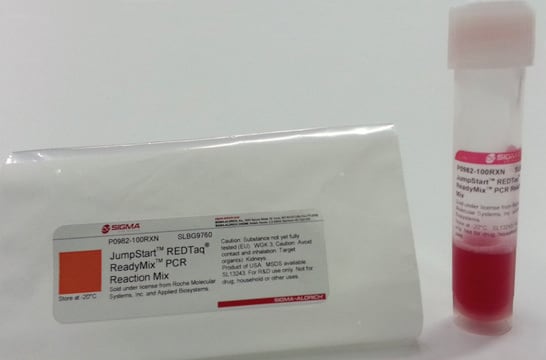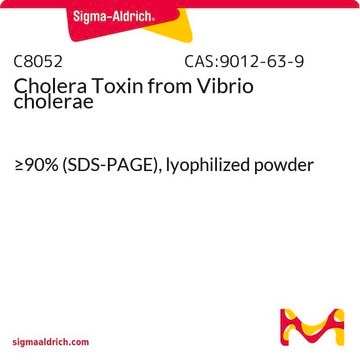P1107
JumpStart™ REDTaq® ReadyMix™ Reaction Mix
for High-throughput PCR of complex templates
Synonym(s):
High throughput PCR, Hot start PCR master mix, Hot start master mix, Hot start taq master mix
About This Item
Recommended Products
Quality Level
form
liquid
usage
sufficient for 100 reactions
sufficient for 400 reactions
feature
Difficult Templates/Specialty Enzymes PCR
dNTPs included
hotstart
concentration
0.75 units/reaction (50 μL reaction volume)
technique(s)
PCR: suitable
color
red
input
purified DNA
application(s)
agriculture
shipped in
wet ice
storage temp.
−20°C
Looking for similar products? Visit Product Comparison Guide
Related Categories
General description
Application
- For multiplex PCR
- For amplification with reduced non-specific amplification
- For high throughput PCR amplification of complex templates
- In the amplification of primers developed for the pathogenicity-associated genes of Clavibacter michiganensis
- For PCR amplification of the human TMPRSS6 gene
Features and Benefits
- JumpStart™ REDTaq® DNA polymerase, an antibody inactivated hot start enzyme, is designed to minimize non-specific amplification while increasing target yield & specificity
- JumpStart Taq DNA polymerase provides superior amplification regardless of template concentration
- REDTaq JumpStart ReadyMix reduces pipetting steps and risk of contamination. The hot start mechanism allows for room temperature set up, making it the ideal for high throughput applications
- Inert red dye allows for easy verification that reagent has been mixed properly
- Other loading dyes are not required. Aliquots may be directly loaded onto an agarose gel after the reaction
Packaging
20RXN is packaged as 1 X 500 μL
100RXN is packaged as 1 X 2.5 mL
800RXN is packaged as 1 X 20 mL
Unit Definition
Other Notes
Legal Information
Antibody licensed for in vitro research use under U.S. Patent No. 5,338,671 and 5,587,287, and corresponding patents in other countries.
related product
Signal Word
Warning
Hazard Statements
Precautionary Statements
Hazard Classifications
Aquatic Chronic 3 - Skin Sens. 1
Storage Class Code
10 - Combustible liquids
WGK
WGK 3
Regulatory Listings
Regulatory Listings are mainly provided for chemical products. Only limited information can be provided here for non-chemical products. No entry means none of the components are listed. It is the user’s obligation to ensure the safe and legal use of the product.
EU REACH Annex XVII (Restriction List)
Certificates of Analysis (COA)
Search for Certificates of Analysis (COA) by entering the products Lot/Batch Number. Lot and Batch Numbers can be found on a product’s label following the words ‘Lot’ or ‘Batch’.
Already Own This Product?
Find documentation for the products that you have recently purchased in the Document Library.
Customers Also Viewed
Articles
Colony PCR reagents and our colony PCR protocol using REDExtract-N-Amp™ PCR ReadyMix™ and JumpStart™ REDTaq® PCR ReadyMix™ reagents.
Explore PCR's history, from discovery to Nobel Prize. Discover real-time PCR (qPCR) and digital PCR developments.
Explore PCR's history, from discovery to Nobel Prize. Discover real-time PCR (qPCR) and digital PCR developments.
Explore PCR's history, from discovery to Nobel Prize. Discover real-time PCR (qPCR) and digital PCR developments.
Protocols
Reviews the applications and benefits for RedTaq, including standard RedTaq, Hot Start RedTaq and RedTaq for genomic DNA PCR.
Protocol using antibody mediated hot start polymerase. Method has short activation period (<1min), and results in higher yields and more specificity over standard PCR methods.
Protocol using antibody mediated hot start polymerase. Method has short activation period (<1min), and results in higher yields and more specificity over standard PCR methods.
Protocol using antibody mediated hot start polymerase. Method has short activation period (<1min), and results in higher yields and more specificity over standard PCR methods.
Our team of scientists has experience in all areas of research including Life Science, Material Science, Chemical Synthesis, Chromatography, Analytical and many others.
Contact Technical Service
















